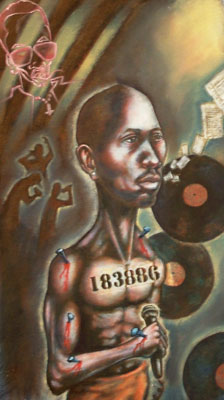My tears have become my bread,
A piece of inner-city tumbleweed rolled in front of me, but I did not let the empty potato chip bag break my stride. I was a man on a mission. It was my first day as a youth worker in Detroit, and I was determined to make a good impression on the first kid I was going to meet. I walked up the cement steps and gave the front door a confident knock. A shirtless, sinewy man answered the door. To say he invited me in would betray the word, but I stepped inside nonetheless. He closed the door and I took a few steps forward. I looked around the cheaply constructed condo and the confidence I had summoned quickly vanished. As an upper-middle class white kid, I quickly realized I was out of my element. There were five or six people in the tiny living room, three on the couch watching television and the rest wandering around looking for nothing in particular. The wall had a few personal photos and magazine pages thumb-tacked to it in lieu of paintings or framed pictures. Other than that, the room was quite bare. It might have been messier if they had been able to afford more clothes or furniture. The kitchen might have been a bit dirtier, too, if they had food with which to dirty the dishes. But neither was the case. A cute little girl with a dirty t-shirt was wedged between two women on the couch. The beads in her braided hair clicked together as she shot me a smile and then turned her head quickly away. Someone hollered and she went running into the kitchen. My stomach turned as she got up. The voice had yelled a word I knew to be sexual innuendo, and she had answered to it as if it was her name. In that moment, I was struck by the gravity of her situation. I had heard a brief synopsis of her “family” life. Drug use, drug dealing, unemployment, poverty, theft, and prison were not uncommon themes. But her story went from fiction to reality in mind as I heard an innocent six-year old girl being beckoned by a sexual nickname. How did any child deserve such a life? Within my first week there, I heard stories that would give trendy atheist intellectuals like Christopher Hitchens and Richard Dawkins enough ammo to last them through their next trip around the Ivy League lecture circuit. What ammo might they garner from the stories, you might ask? Pain and suffering. Seemingly needless pain and suffering. 
"Waiting to pass the time away" - photo by Don Schwager Many people (including, in all likelihood, Dawkins and Hitchens) believe the problem of pain to be the most powerful objection to Christianity. A succinct version of it might go as follows: If God is both all-powerful and all-good, He would put an end to pain and suffering. But pain and suffering still exist. So either (a) God is not powerful enough to end pain and suffering or (b) God allows it to exist and is, therefore, not all-good. As such, the Christian conception of God is a false one. Indeed, the problem of pain is a substantial objection. Answers to it tend not to be quick and easy. But I think the force of the objection lies not in the power of its syllogism, but rather in the weight it places on people’s hearts. The experiential quality of the problem of pain is where its strength lies. How often, for example, do you hear the objection from polytheism raised outside of academic circles? Probably rarely, if ever. Why? Because while people might understand that objection, most do not experience it. The more abstract and esoteric an argument is, the less likely it is to be effective on a large scale. Conversely, the more tangible an argument is, the more likely it is to be largely effective. The suffering youth of Detroit might not be able to envision a philosophically coherent polytheistic world, but they all know the tears they have cried. Those tears are their strongest objection to accepting the Gospel. In the cries for mercy that have undoubtedly been made, youth from the projects ask the exact same question that the Ph.D.’s from the ivory towers ask, “If God is all-good, why does he allow pain and suffering?”
That question seems to linger with me when I hear painful stories. I imagine the dark nights that many youth must endure, the many tears shed without a loving hand to wipe them away. But it is then that I realize the strongest response to the problem of pain lies in our tears. For through them, we know that love exists. Unbelief sheds no tears because it has no hope for love. A world created without purpose has nothing to grieve over. A world of cold calculations, whose inhabitants are subject only to unloving and uncaring scientific processes, cannot be disappointed. Atheism has yet to explain away the existence of human love. For why does it hurt us so when we fail to receive this intangible, indescribable thing we call “love”? Can any other being be moved to tears by the words, “I love you”? Many attempts have been made to explain love in wholly evolutionary terminology, but don’t all the waterworks seem a bit unnecessary? Christianity, on the other hand, says God has instilled in us a distinctly human capacity to show love, and along with it, unique emotions. Its explanation puts us in a world which is both physical and spiritual. In this fallen world, man is living in incomplete union with a perfectly loving Creator and his fellow creation due to his own rebellion. Now wouldn’t that give him all the reason in the world to cry? Stories of profound pain and suffering will continue to be played out. They will leave some almost unable to sympathize and they will leave others asking, “Where is your God?” Either way, the best Christian response is to love. It is both a question and an answer for the unbeliever. Moreover, it shows them that their tears should not be a source of despair, but a source of nourishment. For in those tears is love, and love is the food of the soul. [Joshua Birk majored in philosophy at the University of Michigan, located
in Ann Arbor, Michigan, USA, where he was involved in University
Christian Outreach (UCO). He currently works for YouthWorks
– Detroit.]
|
. | |||
|
publishing address: Park Royal Business Centre, 9-17 Park Royal Road, Suite 108, London NW10 7LQ, United Kingdom email: editor@swordofthespirit.net |
. |

